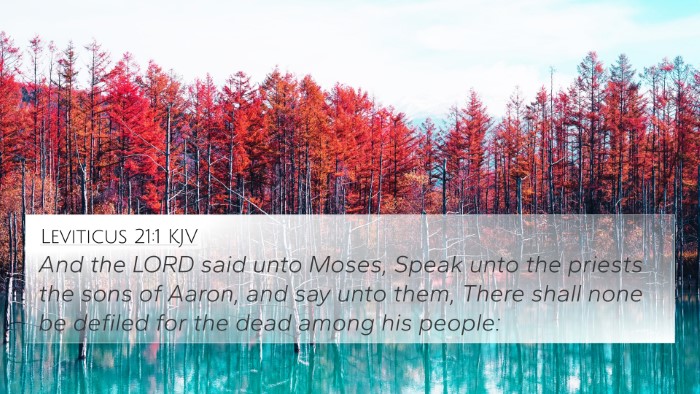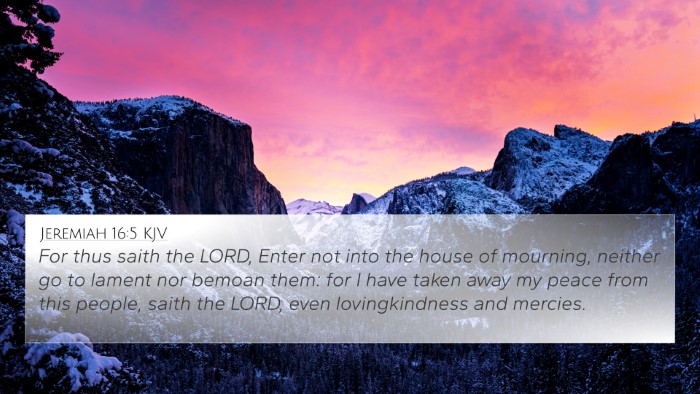Understanding Numbers 6:6
Numbers 6:6 states, "All the days that he separates himself unto the LORD he shall come at no dead body." This verse is part of the Nazirite vow, which outlines the commitment to holiness and separation from worldly influences. Here, the focus is on the sanctity of life and the necessity of maintaining purity while serving the Lord.
Commentary Insights
Matthew Henry's Commentary
Matthew Henry emphasizes that the Nazirite's separation is not just physical but also spiritual. It is about dedication to the service of God. By avoiding dead bodies, the Nazirite ensures his ritual purity, which is crucial for offering true service to God. This avoidance symbolizes a deeper commitment to live a life set apart from sin and death.
Albert Barnes' Notes
Barnes explains that this practice illustrates a profound respect for God's holiness. The dead body represents sin and corruption, thus the refusal to go near it signifies a commitment to the life-giving presence of God. This act of separation implies that those who serve the LORD must live in accordance with His commandments and maintain their sanctity.
Adam Clarke's Commentary
Clarke provides insight into the broader implications of the Nazirite vow. He notes that the ceremonial laws, including the rule against touching a dead body, were intended to teach the people about the nature of holiness. The avoidance of death symbolizes the call to pursue life—spiritually, mentally, and physically. This, Clarke posits, serves to draw a connection to the New Testament teaching where believers are called to embrace eternal life through Christ.
Connections Between Bible Verses
Understanding Numbers 6:6 can be enhanced by looking at various related Bible verses:
- Leviticus 21:1-4: Discusses the holiness expected of priests and their avoidance of dead bodies, linking to the core theme of separation.
- Romans 6:23: "For the wages of sin is death," reflecting on the implications of spiritual death versus the call to holiness.
- 1 Peter 2:9: Emphasizes being a "chosen generation" and the call to holiness mirrors the Nazirite's commitment.
- Ephesians 5:8: "For you were once darkness, but now you are light in the Lord," highlights the theme of separation from death and sin.
- Matthew 5:8: The pure in heart will see God, resonating with the purity expected from a Nazirite.
- Hebrews 10:19-22: Encourages believers to approach God with a sincere heart, paralleling the Nazirite’s dedication.
- Revelation 21:4: The promise of no more death aligns with the Nazirite’s vow of life against the backdrop of death.
Cross-Referencing Biblical Texts
To comprehend Numbers 6:6 fully, we can utilize cross-referencing tools that highlight the thematic connections:
- By utilizing a Bible concordance, one can find various instances where the themes of holiness and separation are evoked.
- A Bible cross-reference guide will pinpoint verses that discuss similar vows and separations in other contexts.
- Cross-reference Bible study methods encourage exploring the intertwining of Old and New Testament themes.
Conclusion
Numbers 6:6 serves as a profound reminder of the seriousness of the calling to holiness and the significance of maintaining spiritual purity. Its connections to other scriptures deepen our understanding of what it means to live dedicated lives before God. By engaging in cross-referencing and thematic studies, we can uncover the rich dialogue that exists throughout the Bible concerning sanctification and separation from sin. The act of embracing these teachings offers believers a clearer path toward living a life that honors God.
Further Study
For those interested in exploring similar themes, consider studying:
- How to find cross-references in the Bible: Utilizing various Bible study tools can uncover many connections.
- Identifying connections between Old and New Testament: Investigate how the themes of holiness evolve across the scriptures.
- Comparative study of Pauline epistles: Analyze how Paul addresses the theme of holiness in the New Testament.
- Cross-referenced themes in the Bible: Explore how different verses correlate in themes such as sanctification, purity, and life.











